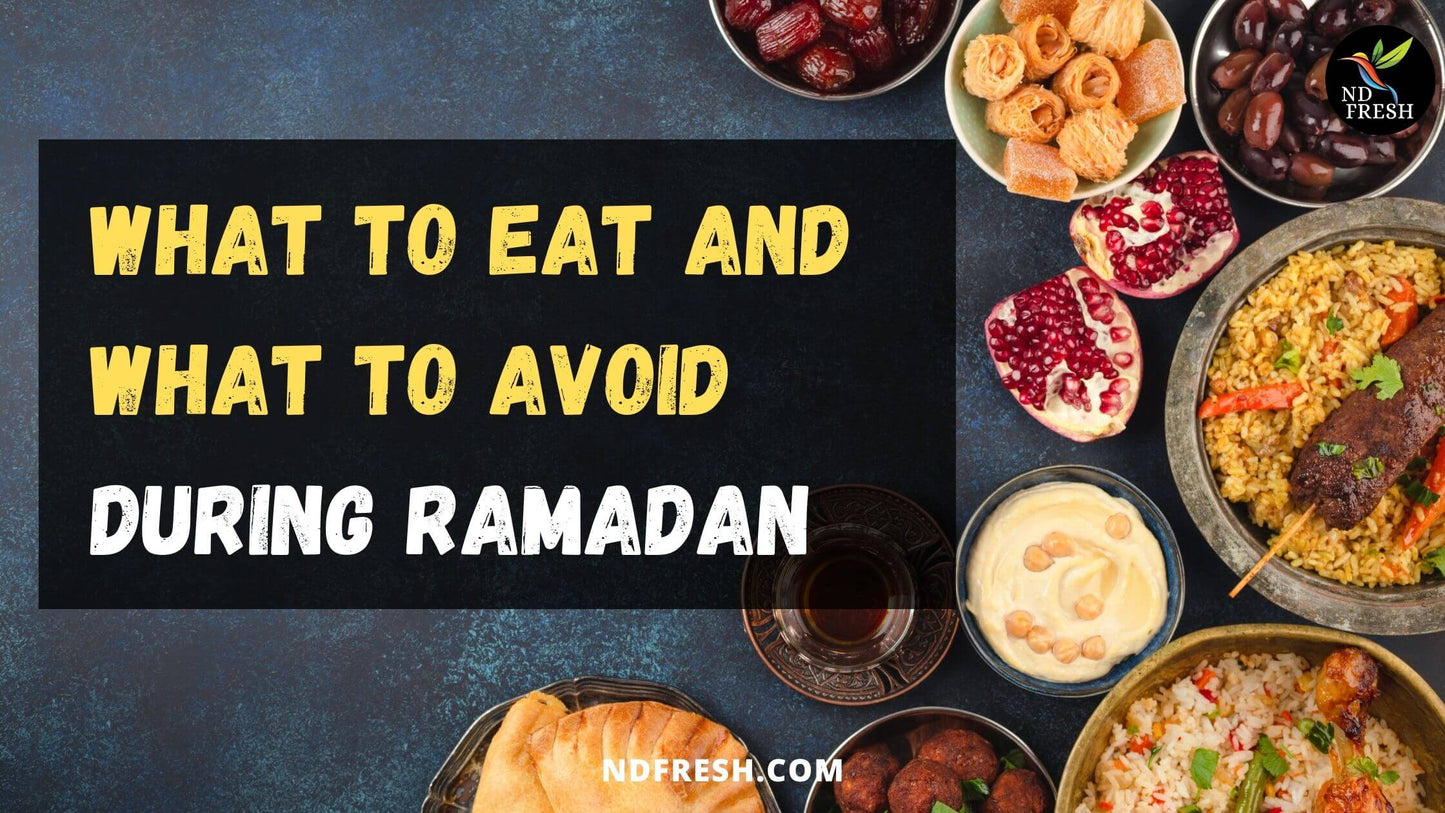
Knowing what to eat and what is not good to eat on Ramadan days is necessary. Are you aware of it? Want to know some pro tips to cope with long fasting hours? Read on
Ramadan is here..! the month of purity and peace. The Ramadan diet should be simple and nutritious. Making a huge difference from your everyday diet may not be good for your health. You need vitamins, minerals, carbohydrates, protein etc..as always.Let's checkout what foods are good to eat and what are not good to eat in Iftar and Suhoor.
IFTAR
Believers break their fasting with a meal called Iftar. At that time the stomach will be craving for food and the body needs water.You can try out the best meal preferred by dietitians, that is 5-6 dates soaked in one cup of milk.The combination of potassium in dates and calcium in milk will restore your energy..!
Prophet Muhammad (s) preferred to break the fasting with dates, otherwise, with fresh water. Science also has approved dates as a healthy food since it makes you feel full and helps you reduce blood pressure. Also that it helps to reduce the risks of heart disease and constipation. It is best to restore sugar and salt levels in your body.
Best Foods At Iftar
- Dates
- Fresh fruit juice
- Vegetables
- Fruits
- Skinless Meat
- Fish
- Steamed snacks
- Rice and alternatives
You should drink water in order to be hydrated. More than freshwater, you can also drink fresh squeezed fruit juice,like lemon juice.It is a good source of vitamin-C. That is efficient for making you energetic. Some steamed snacks can be added to your meal.
THE MAIN COURSE
For this you can choose veggies and grilled, boiled or steamed fish and meat. Meat is a source of high protein and other nutrients. If you get top quality locally sourced fresh halal meat for your cooking ,that's going to make you healthier.
At ND fresh we provide our customers top grade fresh halal meat sourced from best farms in and around Ontario and deliver them in the most hygienic way.
Foods to Avoid
- Oily snacks
- Too spicy foods
- Carbonated drinks
People have a tradition of preparing too many oily snacks on Ramadan days. Eating too greasy and spicy food may not be a good choice in Ramadan. Those are empty calories. It can cause gas trouble and heartburn. So,try to avoid it. Hence, this may lead to acidity and block the liver functions.
Carbonated fizzy drinks are part of our life.Surely, drinking it after fasting might be the worst decision. They don't have any nutrition in it and It will cause damage to the lining of the stomach.
SUHOOR
Suhoor is the time just before the dawn or fajr, and eating in that time is sunnah. You can eat healthy and filling breakfast at suhoor.
Carbohydrates-containing foods like rice, oats and high fibre rich foods like,raw fruits and vegetables are good selections.
Best Foods at Suhoor:
- Fresh vegetables
- Dairy products
- Raw fruits
- Wheat bread
- Rice
- Porridge
- Egg
- Dried fruits
These foods will make you feel full and are good for the digestive system .
Do you like flavoured foods?
If you prefer flavoured foods, you can use spices. Spices give rich flavour to foods without adding any calories, fat, sugar or salt. It provides antioxidant, anti-inflammatory and antibacterial properties. Cinnamon protects from diabetes and pepper helps the body to absorb nutritions more effectively.
One thing always is to make sure to use authentic and high quality spices. Many brands currently available in the market are not good as they claim. If you are looking for truly authentic premium quality spices, you can check out ND Fresh. Our 3000+ five star verified customer reviews will give you the guarantee and trust you are looking for.
Foods to avoid at suhoor:
- Caffeine
- Too salty foods
- Carbonated drinks
- Heavy desserts
You should avoid caffeine at suhoor, that makes you urinate at day time frequently. Thus, you may have to suffer from dehydration. Try to hold the salt and sugar.
How to cope with long fasting hours:
In the long fasting hours, most people suffer from high expectations at work or school, poor nutrition and unhealthy diet. As fasting hours are long,there is a high risk of dehydration. So, you should drink at least 8-10 cups of water from Iftar till Suhoor.
Some fruits that make your skin hydrated:
- Watermelon
- Strawberries
- Grapefruit
- Cantaloupes
These tips keep in mind:
- Get enough sleep
- Ensure well balanced diet
- If you are not well, seek a doctor's help for a better diet.
- You can have 4-5 small meals continuously in between two hours.
Try not to skip the suhoor..!
It may cause serious low blood sugar and dehydration. Overindulging at iftar and suhoor can cause weight gain. Combining healthy foods with fasting resets your metabolism and helps you to lose some pounds. Fasting is also a nice chance to lose weight. People have misinterpreted that eating more as they can provide more energy for the next day of fasting. It is a misconception ..!
At ND Fresh we provide the best quality and fresh vegetables and fruits for you. If you are a meat lover, you get Halal Certified fresh meat vacuum packed at your doorstep. We also provide fresh or freshly marinated fish, as your choice..!.
Use our 100% premium guaranteed spices in your food. With all these qualified products, make your Ramadan meals tasty and healthy with us. Buy our premium quality products online and get home delivered.

